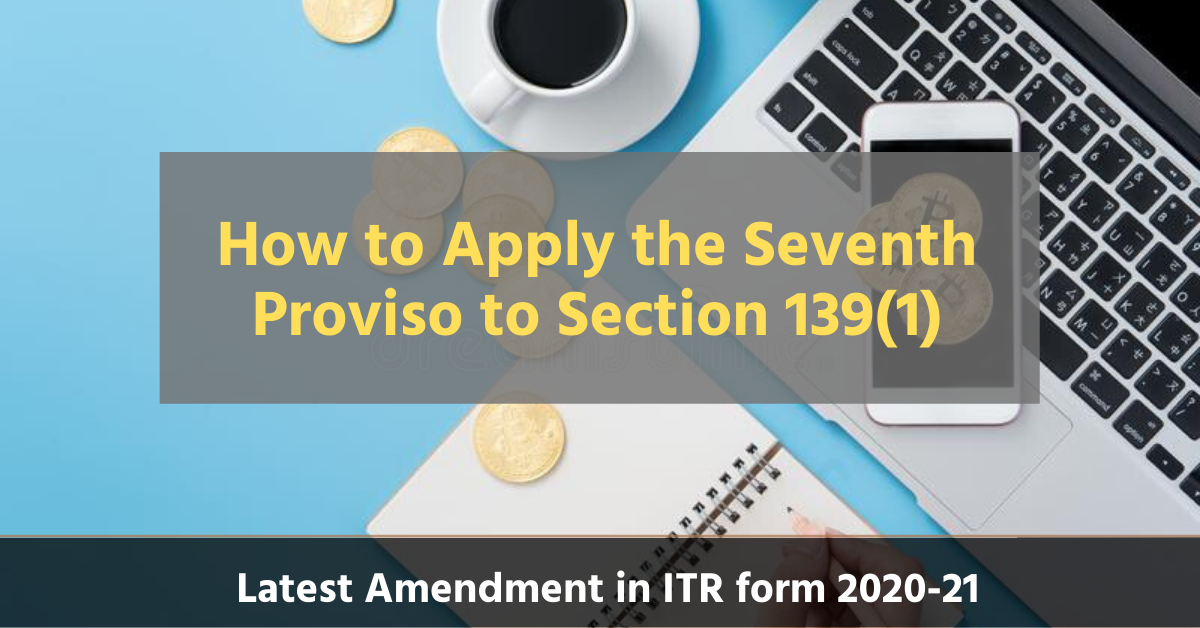Today in this article we will let you know about the Seventh Proviso to Section 139(1) and Latest Amendment in ITR form 2020-21. The Seventh Proviso to Section 139(1) is all about the compulsory filing of return of income in case of high-value transactions or expenditure. Usually, the Income tax return filing is related to the total income, but the Union Budget – 2019 has broadened the scope of compulsory filing of return.

The Finance (No. 2) Act, 2019 amendment with the Seventh Proviso to Section 139(1) mandates to file the return of income for a person undertaking certain high-value transactions or expenditures. Return filing would be mandatory now even though the person is entitled to exemption from taxes due to the basic exemption limit in total income, subject to certain exceptions.
What is Seventh Proviso ?
The seventh proviso to section 139(1) has been inserted after the sixth proviso, and before the Explanation 1 to Finance (No. 2) Act, 2019 with effect from 1st April 2020. There are various provisions related to ‘Voluntary and Mandatory Returns’ Under Section 139 Returns of Income, and it prescribes the due date of filing of return of income with certain exceptions.
Who must file a return of income after Amendment in seventh proviso to Sec 139(1)?
(I) A Company or Firm in every case
(II) Any other person than a company or firm whose total income exceeds the amount exempted from tax. This includes a person who –
– has deposited one crore rupees or more in one or more current accounts whether in cash or by cheque. Savings Accounts are outside the purview of this provision
– has incurred expenditure exceeding Rs 2 lakh for travel to a foreign country
– has incurred expenditure exceeding Rs 1 lakh rupees towards electricity bill
Before the amendment, a person is required to file the return of income only if the total income is more than the income exempted in tax slab. So, a person entering into a high-value transaction is not necessarily required to file a return. But after amendment in section 139 of the Income Tax Act, 1961, a person enters into certain high-value transactions, provided that during the previous year, he has to furnish his return of income.
The main impact of the seventh proviso is on individuals, refer to clause (b), other than a company or a firm.
How to Apply the Seventh Proviso to Section 139(1)
The ITR forms (ITR-1 to ITR-5) for the FY 2019-20/ AY 2020-21 contain information on 7th proviso to section 139(1) and new fields in the ITR forms have been incorporated. The Part-A of the form inquires if you are filing return of income under the requirement of Seventh Proviso to Section 139(1) but are otherwise not required to furnish return of income?
Since a person’s total income is under the tax exemption limit and he is not required to file a return of income but undertakes the high-value transactions, then he is liable to submit the appropriate ITR form.
If any of the conditions fulfilled from the above-said requirements, a person should file the return as the conditions described above are in alternative. Suppose a salaried person’s income from salary and bank interest is less than Rs 2.5 lakhs (the minimum threshold for tax bracket) but has paid electricity bills of Rs. 1,00,000 in Financial Year 2019-20 then he has to file ITR Form-1.
Key Changes in ITR forms for the Assessment Year 2020-21
The new ITR forms (ITR 1 to ITR 7) have been introduced with additional columns and schedules to fill up essential information. These changes are consequential to the amended Income-Tax Act.
- Changes in ITR-V (Acknowledgement form) for the Assessment Year 2020-21
The income tax department has changed the verified and unverified form. The new ITR-V form will show the necessary information about the taxpayer, e-filing data only. There will not be any details of taxes, deductions, and total income. Only after verifying the form, the assessee can download the final ITR-V.
- Rule 12 related to ITR-1 (Sahaj) and ITR-4 (Sugam) has been amended through Notification No. 31/2020 for the AY 2020-21.
Now Joint Owners of House Property can file ITR-1, and ITR-4 provided that they furnish return of income under 7th proviso to section 139(1).
